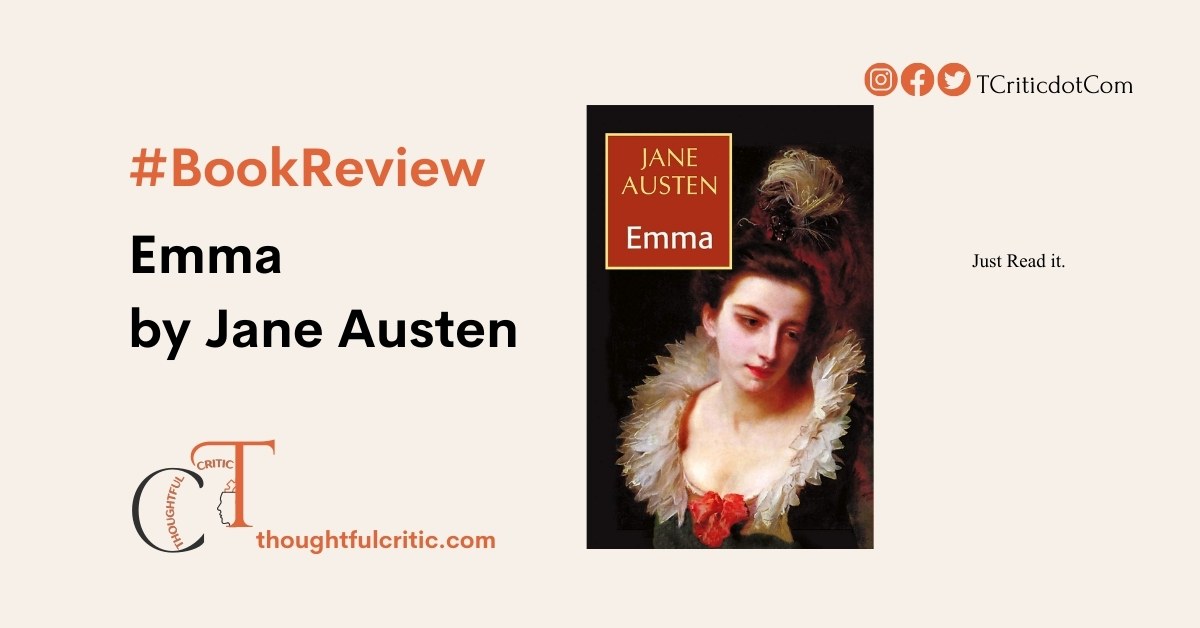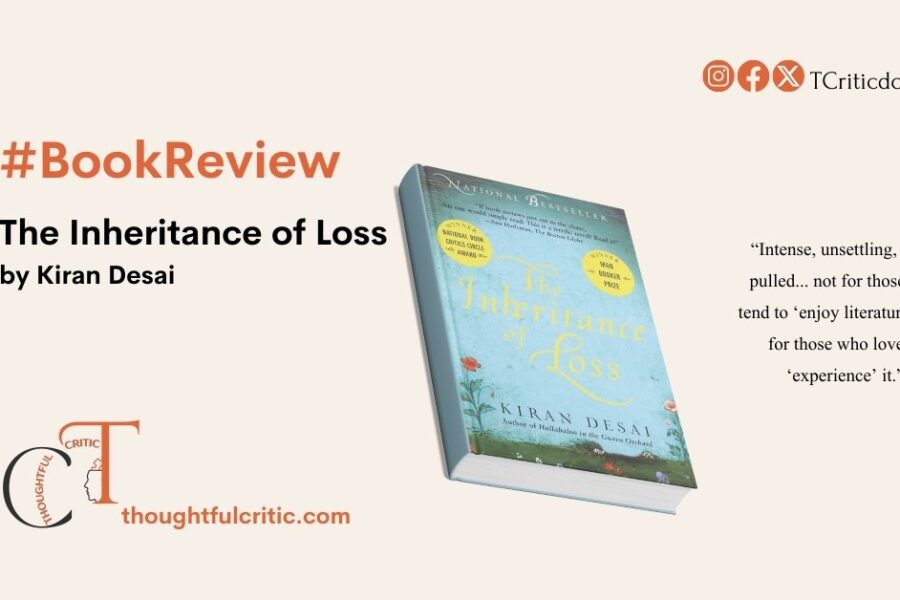Title: Emma
Author: Jane Austen
Publication Date: 1815
Publisher: John Murray
Genre: Novel, Romantic Fiction, Comedy of Manners
Language: English
Pages: Approximately 474 pages (first edition)
Buy a copy: Amazon India (click here)
Emma, first published in 1815, is one of Jane Austen’s most celebrated novels, known for exploring class, social structure, and the intricacies of human relationships. Set in the fictional village of Highbury, the novel centres on Emma Woodhouse, a wealthy, clever, and somewhat spoiled young woman who fancies herself a skilled matchmaker. Austen’s Emma differs from her earlier works in that the heroine does not seek romantic attachment for herself but instead focuses on managing the relationships of others. The novel critiques social expectations and gender roles while presenting a witty commentary on the limitations imposed by societal norms. In this review, I will critically examine the novel’s narrative style, major themes, character development, and literary significance while also addressing its portrayal of 19th-century British society.
Narrative Style
Jane Austen employs a third-person omniscient narrator in Emma, a choice that allows readers insight into the thoughts and motivations of multiple characters. However, the narrative voice often aligns closely with Emma’s perspective, limiting readers’ understanding of her subjective worldview. This technique fosters dramatic irony, as the reader usually perceives the folly of Emma’s actions and assumptions long before she does. Austen’s mastery of free indirect discourse—blurring the lines between the narrator’s voice and a character’s inner thoughts—creates a nuanced portrayal of Emma’s evolving self-awareness and allows readers to sympathise with and critique her.
Austen’s language is also marked by wit and satire, which enrich the novel’s exploration of social conventions. The precision of her dialogue, especially in the interactions between Emma and other characters, highlights the trivialities of polite society and the underlying tensions of class and gender. The narrative’s measured pace reflects the slow unfolding of personal growth and romantic realisation, which Austen handles with elegance and subtlety.
Themes
1. Social Class and Mobility:
A central theme in Emma is the rigid class structure of early 19th-century England, and Austen offers a subtle critique of the hierarchical nature of society. Emma Woodhouse, the daughter of a wealthy landowner, stands at the top of this social ladder, a position that imbues her with a sense of superiority and entitlement. Her interactions with characters from different social strata, such as Harriet Smith, Mr. Weston, and Miss Bates, reveal the complexities of class mobility and its associated prejudices. While Emma frequently asserts her dominance in social matters, Austen uses her mistakes—particularly misguided matchmaking attempts—to demonstrate the limitations of such hierarchies. Ultimately, Emma’s humility and recognition of her social privilege underscore the novel’s critique of class distinctions.
2. Marriage and Relationships:
Marriage, as in many of Austen’s works, is a central concern in Emma, but here, the focus shifts from the heroine’s romantic prospects to her attempts to control the romantic lives of others. Emma’s determination to find suitable matches for her friends leads to misunderstandings and conflicts. Austen explores the social pressures surrounding marriage through Emma’s failed efforts, particularly the economic and class considerations that often override genuine affection. The novel questions the idea that marriage is solely a financial or social transaction, suggesting instead that mutual understanding and personal growth are essential for a successful relationship. Emma’s eventual marriage to Mr Knightley is a romantic resolution and reflects her emotional maturity and self-awareness.
3. Self-Delusion and Personal Growth:
One of the most critical themes in Emma is self-delusion, particularly concerning the heroine’s misjudgements and misconceptions. Emma’s confidence in her abilities as a matchmaker leads her to misinterpret the feelings and intentions of those around her, often to comic or disastrous effect. Austen uses Emma’s numerous missteps—such as her belief that Mr. Elton is in love with Harriet or her failure to recognise Frank Churchill’s attachment to Jane Fairfax—to illustrate the dangers of overconfidence and self-deception. The novel’s central arc follows Emma’s gradual realisation of her flaws and growing understanding of human emotion’s complexities. By the novel’s end, Emma has transformed from a character blinded by vanity and privilege into a more self-aware and empathetic character.
4. Gender and Power:
While Emma is set in a patriarchal society where women’s roles are confined mainly to domestic spheres, Austen subtly critiques these gender dynamics by presenting a heroine who exercises considerable agency. Emma’s social position allows her a level of independence unusual for women of her time, and she uses her influence to shape the lives of those around her. However, Austen does not present this power uncritically; Emma’s manipulations often backfire, and her eventual reconciliation with Mr Knightley—an older, more experienced figure—can be read as a reassertion of traditional gender roles. Nevertheless, Austen’s portrayal of Emma as a complex, flawed, and ultimately self-determined character challenges simplistic readings of gender and authority in the novel.
Character Development
Emma Woodhouse:
Emma is one of Austen’s most unconventional heroines, mainly because of her privileged status and lack of desire for marriage—a significant departure from characters like Elizabeth Bennet or Fanny Price. Austen paints Emma as a complex figure who is both likeable and exasperating. Emma’s arrogance and self-assuredness initially lead her to make several errors in judgment, and her flaws are exposed through her interactions with characters of different social standings. However, Austen skillfully balances these traits with moments of vulnerability and kindness, making Emma a character with real emotional depth. Her growth throughout the novel is gradual but profound, culminating in her acceptance of her limitations and the realisation that she, too, is capable of romantic attachment.
George Knightley:
As Emma’s neighbour, confidant, and eventual romantic partner, Mr. Knightley plays a crucial role in her personal development. He is portrayed as a morally upright and rational figure, often acting as a voice of reason in contrast to Emma’s impulsiveness. His criticisms of Emma, though harsh at times, stem from a genuine concern for her well-being, and his relationship with her evolves from mentor and mentee to one of equals. Knightley’s patience, honesty, and ability to see through the social pretensions that Emma often indulges in mark him as a moral centre in the novel. This figure embodies the ideal of emotional maturity and integrity.
Harriet Smith:
Harriet Smith, Emma’s protégé, represents the malleability of social identity in the novel. As the illegitimate daughter of unknown parentage, Harriet occupies a precarious social position, and her relationship with Emma highlights the dynamics of class and control. Emma’s attempts to elevate Harriet’s status by steering her away from suitable matches like Robert Martin serve as a commentary on the limitations of social mobility. Despite Emma’s meddling, Harriet’s eventual marriage to Martin signifies the triumph of genuine affection over class-based ambitions, further underlining Austen’s critique of social stratification.
Frank Churchill and Jane Fairfax:
Frank Churchill and Jane Fairfax serve as foils to Emma and Mr. Knightley, with their secret engagement providing a subplot that mirrors and contrasts the main narrative. Frank’s charm and flirtatious behaviour mask his true intentions, while Jane’s quiet dignity and emotional restraint contrast sharply with Emma’s more outspoken nature. The eventual revelation of their relationship serves as a reminder that appearances can be deceiving and that proper understanding requires looking beyond social conventions and surface-level behaviour.
Literary Significance
Emma occupies a significant place in the canon of English literature, not only for its keen social commentary but also for its sophisticated characterisation and narrative structure. Austen’s exploration of the heroine’s inner life—her self-delusions, her gradual recognition of her flaws, and her ultimate growth—elevates the novel beyond a simple romantic comedy. Emma is a novel that rewards close reading, as Austen’s nuanced use of language, irony, and free indirect discourse enriches the text’s emotional and intellectual depth. Furthermore, the novel’s portrayal of a flawed but fundamentally well-intentioned heroine has influenced countless subsequent works of fiction, making Emma Woodhouse a prototype for complex, morally ambiguous characters in literature.
Critical Analysis
Though Emma is widely regarded as one of Austen’s finest novels, its reception has not been without controversy. Some critics have argued that Emma Woodhouse’s privileged position and her initial lack of self-awareness make her a less sympathetic heroine than those of Austen’s earlier works. Her tendency to interfere in the lives of others, often with disastrous consequences, has led to accusations of arrogance and elitism. However, a more nuanced reading reveals that Emma’s flaws are essential to her character arc. Austen does not condone Emma’s actions; instead, she uses them to illustrate the importance of humility, empathy, and self-reflection.
The novel’s exploration of social class has also sparked debate, particularly regarding Austen’s treatment of characters like Harriet Smith and Miss Bates. While some argue that the novel reinforces class divisions, others contend that Austen critiques the rigid hierarchies of her time by exposing the limitations and hypocrisies of the gentry. Moreover, Austen’s subtle critique of gender roles, mainly through Emma’s relative independence and Mr Knightley’s progressive views on marriage, adds another layer of complexity to the novel.
Conclusion
In conclusion, Emma by Jane Austen is a novel that continues to resonate with readers for its keen insights into human nature, social structures, and the delicate balance between personal growth and societal expectations. Austen’s ability to craft a flawed yet ultimately likeable heroine, combined with her mastery of irony, makes Emma a compelling read for those who appreciate literary depth, wit, and complex characterisation. The novel’s exploration of class mobility, gender roles, and self-delusion ensures that it remains relevant. It offers a critical lens through which to view the social conventions of Austen’s time and those of today.
Emma is essential for readers interested in 19th-century British society or those who appreciate intricate social commentary wrapped in a romantic narrative. Austen’s subtle critique of the class system and her portrayal of a heroine who defies conventional expectations provide an intellectual challenge that rewards careful analysis. The novel’s free indirect discourse and layered irony will particularly appeal to readers with a taste for nuanced and multi-dimensional storytelling.
However, Emma may feel slow or overly reflective for those who prefer fast-paced plots or more conventional romantic narratives. The novel’s focus on social intricacies and the heroine’s gradual personal evolution may not satisfy readers looking for immediate drama or overt emotional stakes. Moreover, Emma’s initial arrogance and meddling nature may alienate readers who prefer more traditionally sympathetic protagonists. Yet, these qualities make her growth so profound, a testament to Austen’s skill in developing her characters.
Ultimately, Emma is a novel best suited for readers who enjoy thoughtful, character-driven stories, where the true rewards lie not in grand romantic gestures but in the subtle, slow unfolding of self-realisation and moral development. Whether you appreciate Austen’s biting social critique or her deft portrayal of the complexities of the human heart, Emma stands as a timeless work of literature, rich with insight and charm.
Click here to get a copy now – Amazon India
Other Novels by Jane Austen:
Review by Vyom for Thoughtful Critic
Emma by Jane Austen Book Review (with analysis and critical summary)
-
Critical Rating
Summary
Emma, I may stand against the world, offers wittier situational comedy than Pride and Prejudice. You need to read it (again if you already did) to learn about those situations and appreciate Austen’s writing! Enjoy!




